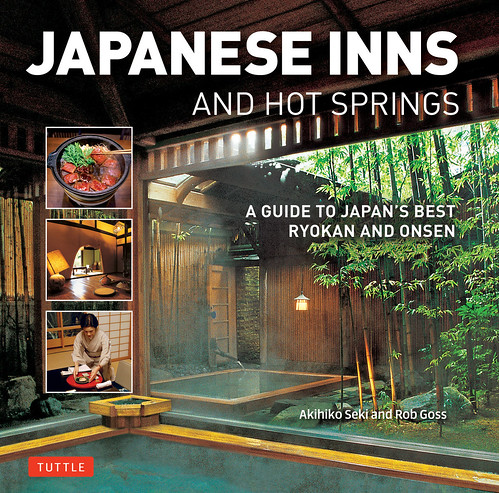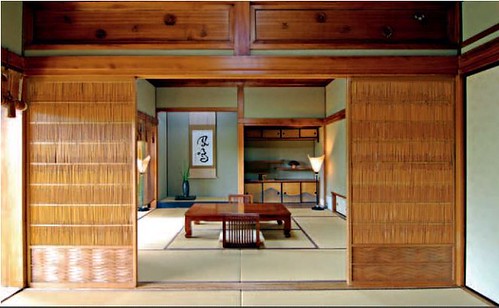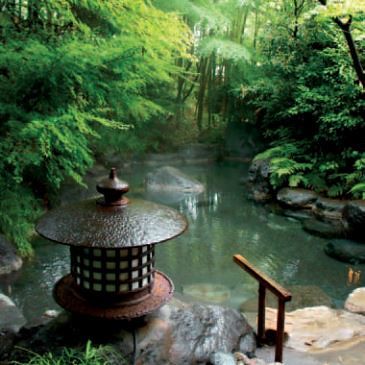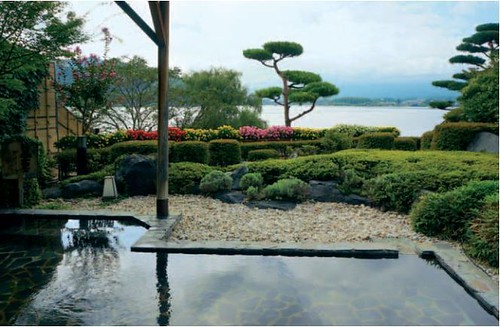Imagine opening a book so filled with peace that you long to jump in and revel in it. Such is the case with the new book by author Rob Goss and photographer Akihiko Seki, entitled Japanese Inns and Hot Springs: A Guide to Japan's Best Ryokan and Onsen. Reading this book offers both travel inspiration and peacefulness.

Japan is a country of contrasts - high tech and playful, and traditional and calm. Nowhere is the calmness personified more than at traditional Japanese inns, called ryokan, where Japanese hospitality shines.
As anyone who has stayed at a ryokan will tell you, the experience is more than a windwo to classic Japan, it affords an opportunity to immerse yourself in tradition; to experience old Japan as the Japanese have done for generations - in a way that is unadulterated, unhurried, and undoubtedly unforgettable.
This guide offers a perfect introduction to ryokan and onsen, if you've never been, and clear descriptions for those that can't wait to visit, and just need to decide up on which ones. The book includes tips on etiquette, extraordinary photographs capturing the essence of ryokan around the country, and, my favorite part, a deep history of each inn. You'll learn about the families that run them (at the Honke Banyo ryokan near Tokyo, you'll learn that 25 generations - over 500 years! - have run the inn; at the Houshi, 47 generations run the second oldest hotel in the world, founded in 718!), local attractions, lodging options within each ryokan, seasonal gourmet cuisine, arts and performances, and more. The book is arranged geographically, and presents 40 exceptional inns that will have you planning your trip(s) to Japan.
Seki's gorgeous photos show tranquility, fine dining, ryokan rooms and gardens, and the enormous variety of hot springs in Japan; Goss' writing is beautiful, lending itself to the subject of history, travel, and the ryokan/onsen experience so well that you feel as if you're exploring Japan with an infinitely knowledgeable guide - one who knows the ins and outs so well that you're confident that you're in good hands.
I've never seen a book that made me want to explore a place more...and offered so many intriguing choices with in-depth profiles and photos.
Highly, highly recommended.
We were lucky enough to catch up with Goss, and ask him about the book, inspiration, tips, and more. Here's what he had to say...

Please tell us about your book, Japanese Inns and Hot Springs...
It’s a photo-heavy look, along with photographer Akihiko Seki, at 40 of Japan’s best ryokan (inns), which in most cases also include (usually communal) natural hot-spring baths (called onsen). We’ve covered most of the country, from historic properties such as the 1,300-year-old Houshi in Awazu Onsen, which incredibly has remained in the same family all that time, to contemporary options like the Zaborin in Niseko and Tenku-no-Mori in Kagoshima. And at the front of the book we have also looked at the etiquette and ways of enjoying ryokan, detailed a typical stay, and gone into the history of ryokan. Hopefully, it reveals to readers many of the traits of traditional Japanese culture, be that cuisine, architecture or hospitality, as well as delving into what makes ryokan (and especially these 40) such a special experience. With each ryokan, we have also expanded to look at the local area, covering the main attractions nearby.
What inspired you to write this book?
We did it partly because we knew it would be a lot of fun to research, but mainly to try and make this kind of accommodation more accessible to travelers to Japan. The experience of staying at a ryokan—the traditional design, the hospitality, the fine food, the bathing—is something that can look a bit intimidating because it is such a deep immersion into Japanese culture, but it shouldn’t be. Anyone can enjoy it and it can be an unforgettable experience.

What are your backgrounds in ryokan and onsen? What are your earliest memories of these experiences?
My earliest experience would be going on ryokan trips with my then girlfriend (now wife) about 15 years ago; hardly speaking any Japanese at the time and not really knowing much about Japanese culture. Now, I go on a couple of family ryokan trips a year, as it’s a very relaxing way to spend a weekend away from Tokyo. I also spend a lot of time at ryokan on work trips – when you get away from the cities, they are much better places for getting a sense of the region or town you are in than staying at a standard hotel.
What might people be surprised to learn about ryokan and onsen?
How good the food is. In many of the best ryokan, the intricate evening meals rival Michelin-starred restaurants. Even in mid-range ryokan, the quality and presentation of meals—focused on seasonal, local produce—tends to be very high. Also, from afar ryokan all seem to offer a similar experience. They do have unifying traits, but I hope this book shows how much variation there is in terms of design, experiences, ambience, and so on.

Can you please share tips for experiencing onsen?
Some people are put off using an onsen bath because they don’t want to be naked in front of strangers, but that doesn’t have to stop you. You can book ryokan rooms that have their own in-room (or on-balcony) onsen baths and many ryokan also have a bath set aside for private use (you just need to book it in advance). Other than that, just follow the bathing etiquette – the most important thing being to wash and rinse fully before entering the communal bathtub.
What were some of the joys and challenges of researching this book?
The answer to both is travel. I got to travel to some wonderful parts of Japan and stay at some of the country’s best ryokan for this book, so I have to be thankful that I earn a living while enjoying experiences like that. Like many projects for a travel writer, however, it meant being away from home a lot, which in my case meant being away from my wife and son. So, more than anything—and it’s the same with every project—I have to thank them for putting up with my travels.

All photos courtesy and copyright Tuttle Publishing
